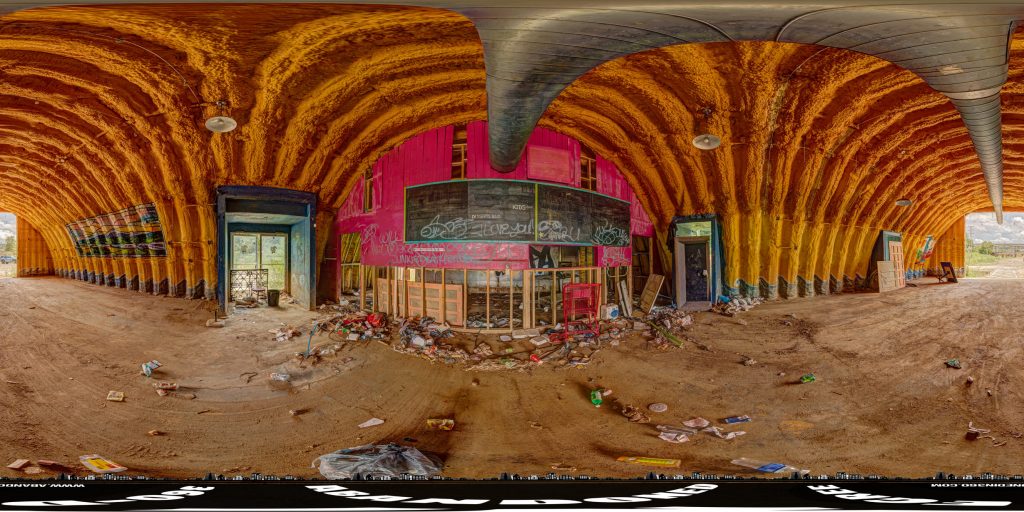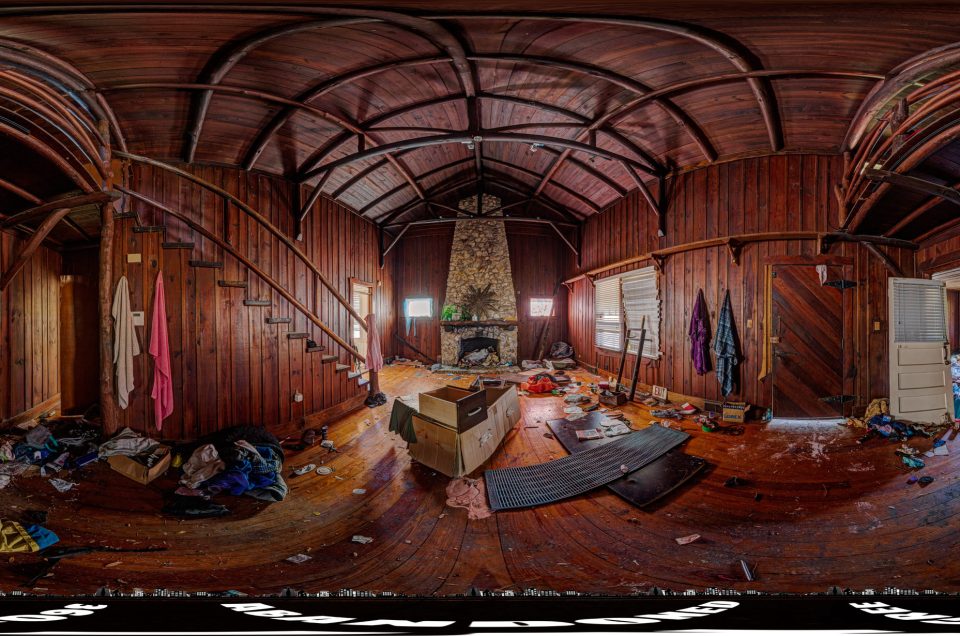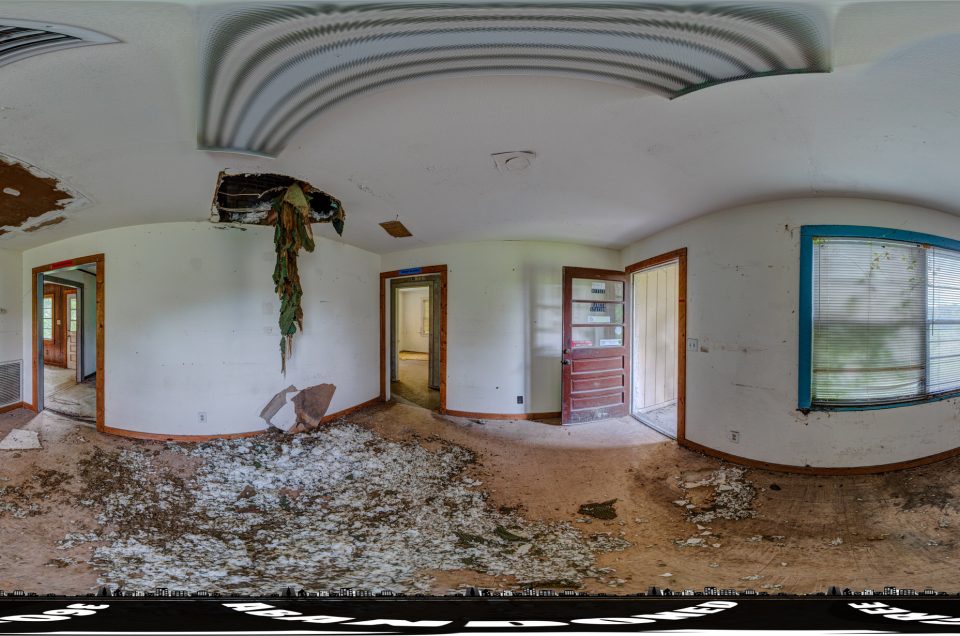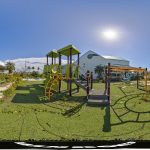Abandoned White Duck Taco Shop in Asheville, NC – From Riverside Favorite to Urban Explorer’s Haunt
Step inside the captivating world of the White Duck Taco Shop through a fully immersive 360-degree virtual experience. Captured in stunning detail by the Abandoned in 360 Urbex Team, this virtual tour offers an intimate look at the building’s current state, preserving every unique feature and weathered surface for explorers who crave a closer view. Each image is a portal into the atmosphere of this abandoned site, allowing you to experience the textures, colors, and details as if you were standing there yourself.
With 5 panoramic images to explore, the virtual tour invites you to slow down and take in every angle. Whether you’re fascinated by the remnants of its past life or simply drawn to the artistry of urban decay, these scenes offer a rare opportunity to appreciate the White Duck Taco Shop from a perspective few ever get to see. Take your time—each frame reveals something new for the observant eye.
Click here to view it in fullscreen.
Tucked away in Asheville’s vibrant River Arts District stood a restaurant that once brimmed with life: the White Duck Taco Shop on Riverside Drive. Today, that very site sits silent and abandoned in North Carolina, drawing curious onlookers and urban explorers to its mud-stained remnants. How did a bustling eatery, cherished by locals and tourists alike, end up as an abandoned shell? The answer lies in a decade of history – from the shop’s humble beginnings to a natural disaster that forced its closure. In this blog post, we’ll delve into the rise and fall of this famous taco shop: when it opened, how long it served the community, why it was ultimately abandoned, and what historical significance clings to its walls. Join us on this journey into one of Asheville’s most intriguing urban ruins, a place that’s quickly becoming a touchstone for urban exploring in North Carolina.
A Beloved Taco Shop is Born in Asheville
The story begins in 2011, when the original White Duck Taco Shop opened its doors in Asheville’s River Arts District. Co-owner and chef Laura Reuss earned the nickname “La Pata Blanca” (“White Duck”) for her habit of excitedly chatting in the kitchen – a moniker that inspired the restaurant’s quirky name. Alongside her partner Ben Mixson, Reuss launched White Duck Taco Shop as a creative, casual eatery where tacos weren’t just dinner, but a canvas for inventive flavors. The first location found its home in the Hatchery Studios building, a repurposed warehouse space that fit right in with the neighborhood’s artsy, industrial vibe. With just a few dozen seats inside and a patio overlooking the French Broad River, the spot quickly captured Asheville’s heart.
From day one, White Duck Taco Shop stood out for its fun fusion tacos (think Bangkok shrimp or banh mi tofu) and affordable, a la carte menu. Asheville’s “Foodtopia” community embraced the shop enthusiastically. In fact, White Duck became known as one of Asheville’s best restaurants soon after opening. As its reputation grew, so did its footprint. Over the next few years, the little taco joint that could blossomed into a mini-empire of taco shops. By the mid-2010s, White Duck Taco had expanded to multiple locations around Western North Carolina and beyond, including downtown Asheville, Arden (South Asheville), and even out-of-state spots like Johnson City, TN and Charleston, SC. The Riverside Drive restaurant remained the flagship and fan favorite – a must-visit for anyone looking to experience Asheville’s eclectic food scene. It wasn’t just locals who loved it; out-of-towners often made it a point to stop by, drawn by glowing reviews and word-of-mouth about the shop’s vibrant flavors and riverside charm.
Riverside Drive: From Industrial Past to Taco Paradise
To appreciate the significance of White Duck’s Riverside Drive location, it helps to understand the area’s history. Asheville’s River Arts District (RAD) wasn’t always full of galleries and cafes. Many years ago, this district consisted of abandoned factories and industrial warehouses lining the French Broad River. In the late 20th century, enterprising artists began converting those derelict buildings into studios and workshops, sparking a renaissance in the area. Before long, art galleries, breweries, and restaurants – including White Duck Taco Shop – followed suit, turning the once-neglected riverfront into a lively cultural hub. The transformation of old warehouses into creative spaces gave RAD a unique character: railroad tracks and loading docks mixed with murals, sculpture gardens, and trendy eateries. White Duck Taco Shop perfectly embodied this spirit of renewal.
When it opened in 2011, White Duck occupied part of a historic warehouse (the Hatchery Studios) with high ceilings and a rustic-industrial feel. The building’s name hints at its past – it may have been a literal hatchery or factory – but by the 2010s it was a community of artist studios with a taco shop at its heart. Diners could sit at picnic tables outside, often alongside local artists taking a break, and enjoy views of the French Broad River rolling by. The shop’s interior was splashed with colorful decor and often packed elbow-to-elbow with hungry patrons. Parking was sometimes a challenge on busy days, but nobody seemed to mind walking a bit to get those famous tacos.
White Duck’s success eventually led to a need for more space. In 2018, the owners made a bold move – quite literally down the road. White Duck Taco Shop moved to a larger property just a block away on Riverside Drive, a three-acre riverfront parcel that offered more parking, expanded indoor/outdoor seating, and even room for some whimsical additions. The new location still hugged the banks of the French Broad, trading up to an even more scenic spot at the water’s edge. Regulars might recall the unique quonset-hut style structure of the new building – an arched roof and broad open interior – which gave it a funky, spacious vibe. The owners decorated the grounds with strings of lights and colorful picnic tables, cultivating a laid-back atmosphere under the sycamore trees. There was even a school bus on site converted into a mini-brewery taproom, adding to the quirky charm. By relocating, White Duck was doubling down on the RAD area, cementing its status as an anchor business in the neighborhood. For roughly a decade – from the early 2010s through the early 2020s – the Riverside Drive White Duck Taco Shop was not just a restaurant but a local landmark. It fed artists after long studio days, gave tourists a taste of Asheville’s creativity (literally and figuratively), and even hosted countless first dates, family lunches, and celebratory meals. As one local writer reminisced, the riverfront White Duck was the scene of many personal memories: from first legal drinks of watermelon sangria slushies to Mother’s Day lunches and college friend reunions. In short, it was more than just a taco joint – it was part of the fabric of Asheville’s community.
Hurricane Helene – Disaster Strikes the River Arts District
All that changed in late September 2024 when Hurricane Helene barreled through the Southeast. By the time Helene’s remnants reached Western North Carolina, they unleashed torrential rainfall on the mountains. Asheville’s normally picturesque French Broad River turned into a raging force of nature. After two days of relentless downpour, the river swelled to record levels. The French Broad rose to an astonishing height of around 30 feet, flooding areas that had never seen water before. The River Arts District, situated on low ground by the river, took a direct hit. On the morning after Helene’s passage, residents were confronted with apocalyptic scenes: the entire west side of the city along the river was underwater. Streets had become brown, churning rivers. Buildings were submerged to their rooftops. Art studios, breweries, music venues, and restaurants that once buzzed with life were now silent, waterlogged ruins.
White Duck Taco Shop’s beloved Riverside Drive location lay directly in the flood’s path. In fact, the floodwaters nearly swallowed the restaurant whole – witnesses reported that only the tiniest bit of the building remained above water at the flood’s height. An eerie drone photo circulating online showed the taco shop’s quonset-hut roof barely peeking above an endless sea of muddy water. Everything else – picnic tables, fences, outbuildings – was completely submerged. Long-time patrons and staff looked on in horror as their happy taco spot disappeared under the French Broad’s torrents. No one could have imagined such devastation; locals said it was the worst flooding in living memory for Asheville.
Helene’s impact on the River Arts District was catastrophic. As the waters receded after several days, they left behind a thick film of mud, debris, and destruction. At White Duck Taco Shop, the scene was heartbreaking. The colorful picnic tables had been washed away, swept downstream or buried in mud. That whimsical school-bus-turned-brewery? It had been flipped over by the force of the water and carried about 500 feet from where it originally sat – a testament to the sheer power of the flood. Inside the restaurant, everything was soaked and coated in muck. Once-bright murals and paint were smeared with brown silt. A layer of several inches of mud covered the floors throughout the building. Industrial appliances in the kitchen were ruined, and furniture was strewn about. In some spots, the drywall and insulation were peeled away by the water pressure. A heavy, dank smell of river water and mud permeated the air.
Emergency responders and the National Guard had more pressing concerns in the immediate aftermath (rescuing people, restoring utilities, etc.), so it took a little time for cleanup crews to reach individual businesses. But soon, efforts were underway to muck out what was left of White Duck. Photos from local news outlets showed workers with heavy equipment beginning to clean up the White Duck Taco Shop site, dragging out debris and shoveling thick mud from the interior. In one image, a small bulldozer is seen inside the restaurant pushing mud off the floor while a stained, abstract mural hangs lopsided on the wall. The scene looked like something out of a nightmare for any restaurant owner. Yet, in those early days, there was still some hope that perhaps the structure could be salvaged or at least rebuilt.
Hurricane Helene’s toll on Asheville was immense. Tragically, dozens of people lost their lives in the region due to flooding and landslides, and thousands were left without power or clean water for weeks. Entire stretches of infrastructure were destroyed. In the River Arts District alone, about two-thirds of the buildings were destroyed or severely damaged according to local officials. Long-standing landmarks like the Antique Tobacco Barn and an artisan marketplace called Marquee were reduced to rubble. A huge sinkhole even opened near the intersection of Riverside Drive and Haywood Street, not far from White Duck’s location. The district was unrecognizable – what had been a quirky arts haven was now a flood-ravaged disaster zone. One local artist described it as “completely apocalyptic,” saying it felt like watching the spirit of Asheville get washed away. For the owners and fans of White Duck Taco Shop, it was almost too much to process. In an emotional social media post, the White Duck team expressed heartbreak at seeing their Asheville home devastated by Helene. The River Arts District location was especially hard hit, as was White Duck’s nearby headquarters office. They thanked the community for its support and vowed to bounce back, but it was clear that returning to “business as usual” at 388 Riverside Drive would not happen anytime soon.
Why the White Duck Taco Shop Was Abandoned
In the wake of Hurricane Helene, one grim reality set in: the Riverside Drive building that housed White Duck Taco Shop was no longer viable. The flood damage was so extensive – structurally and environmentally – that reopening the restaurant in the same spot posed major challenges. For one, the building had been underwater almost to the roofline, which meant electrical systems, plumbing, heating/cooling, and much of the physical structure were compromised or ruined. Even after cleaning out the mud and debris, extensive repairs would be needed: new drywall, flooring, kitchen equipment, and likely significant structural assessments to ensure the building was sound. Moreover, health and safety became a concern. Floodwaters from Helene weren’t just rainwater; they were contaminated with everything the water picked up along its destructive path (chemicals from nearby factories, gasoline, sewage, etc.). The ground around the French Broad River was left a “brownfield” of pollutants, as one observer pointed out, raising questions about whether it was even safe to rebuild on the same foundation. There was a real fear of mold and toxins in any building that had been submerged in that flood.
Given these hurdles, White Duck’s owners had to make a tough decision. Rather than attempt to restore the heavily damaged site, they chose to abandon the building – at least for the foreseeable future – and focus on relocating. In practical terms, the White Duck Taco Shop at 388 Riverside Drive was permanently closed in the aftermath of Helene. What had been a bustling taco destination instantly became an empty shell once the cleanup crews departed. As months passed, there were no signs of the restaurant reopening there. The lights remained off, the doors shuttered. A “temporarily closed” notice appeared on White Duck’s official website next to the River Arts District location, but the description made it clear that the flagship “River Duck” had effectively flown the coop: they announced that the restaurant would “fly a block away” to a new spot on higher ground across the river. In other words, White Duck plans to rebuild, but not on the exact floodplain plot that had been so badly hit. Instead, they are constructing a new, improved location on the east bank of the French Broad River – a bit more upland and hopefully safer from future floods.
This decision explains why the original Riverside Drive building now sits abandoned. It’s not that the business died – White Duck Taco Shop as a company is very much alive, with their other Asheville locations (downtown and South Asheville) and franchises in other cities reopening and serving customers. But the physical building at 388 Riverside Drive was effectively written off after Hurricane Helene’s damage. The owners likely weighed the cost and risk of rebuilding there and concluded it was wiser to start fresh elsewhere than to pour resources into a structure that nature might just reclaim again. It’s a sobering outcome, considering that location had been the heart and soul of White Duck’s origins. Yet, it’s an outcome many other business owners in the River Arts District faced too; dozens of buildings were left uninhabitable, turning parts of this once-thriving area into a ghost town of flood-wrecked structures.
For the urban explorer or the curious passerby, the White Duck Taco Shop site presents an arresting scene. The once-colorful “taco graffiti” and murals that decorated the building are now faded under layers of silt. The windows that weren’t shattered are clouded with dirt, offering only glimpses of a gutted interior. Peering inside, one might see the outline of where the ordering counter used to be, or the dangling light fixtures caked in dried mud. The floor is likely still stained with the brown tint of river mud, and any tile or wood that was there has warped or been removed. In the yard where picnic tables once invited diners to relax by the river, there’s an emptiness – perhaps a concrete slab or two, maybe a twisted metal frame that used to hold a shade sail, and weeds beginning to creep back in. The cheerful ambiance has been replaced by an eerie stillness, broken only by the sound of the nearby river that caused all the destruction.
The Abandoned Site Today – An Urban Explorer’s Perspective
For those interested in urban exploring in North Carolina, the abandoned White Duck Taco Shop is a site that encapsulates both the allure and the caution of exploring disaster-hit places. It resides in that limbo between a recent tragedy and future redevelopment. Walk around the property today and you’ll feel a mix of emotions. On one hand, there’s the palpable sense of loss – menus still might cling to the wall behind the counter, now water-stained and unreadable, and a once-proud sign may lie toppled amid rubble (one report noted a River Arts District sign sitting in the rubble along Riverside Drive). On the other hand, there’s a strange beauty in how nature is reclaiming the space. Wild grasses and vines have started to grow through cracks in the pavement and around the foundation. If you visit during Asheville’s warmer months, you might see butterflies flitting through what used to be the dining patio, now overgrown. The French Broad River flows just steps away, seemingly tranquil again, belying the havoc it wreaked.
Urban explorers are often drawn to places like this for their “time capsule” quality. Indeed, the White Duck Taco Shop site offers a snapshot of late 2024 frozen in time. You might spot everyday items left behind that suddenly feel uncanny in their abandonment – a mud-covered chair here, a tilted “Order Here” sign there, maybe even some taco baskets or trays piled in a corner. Everything is coated in a fine dust now. The smell of fried fish tacos and fresh pico de gallo that once wafted from the kitchen has long dissipated, replaced by a faint mustiness of damp wood and earth. It’s quiet, save for maybe the hum of distant traffic or the chirping of birds that have made new homes in the rafters. If you close your eyes, you can almost imagine the laughter and chatter that filled this space not long ago. Now, it’s the domain of spiders and the occasional stray cat.
While the site is compelling, it’s important to note that safety and legality are paramount. The building is private property and likely marked with “No Trespassing” signs since it’s unsafe to enter. Urban explorers must respect such warnings – both out of respect for the owners and for their own wellbeing. Flood-damaged structures can be hazardous; there might be structural weaknesses, exposed nails, or even pockets of contamination (mold or chemicals) inside. So, any exploration should be done from a respectful distance, observing from public areas or with permission if possible. The story and visuals of the abandoned taco shop can be appreciated without venturing into danger.
Even from the outside, there’s plenty to ponder. Standing in front of the shuttered White Duck Taco, you might reflect on how quickly nature can upend our creations. The restaurant thrived for years, serving thousands of meals, and within a single day of extreme weather it was brought to its knees. It’s a stark reminder that North Carolina’s abandoned places often have dramatic stories behind them – fires, hurricanes, economic shifts – and they become meaningful sites for remembering what once was. Asheville’s community, for instance, will always remember Hurricane Helene for the lives lost and neighborhoods changed. This empty taco shop has become one small memorial to that event, symbolizing both the fragility and resilience of the city.
Historical Significance and Legacy
Although it’s now an abandoned building, the White Duck Taco Shop on Riverside Drive holds a notable place in Asheville’s recent history. Culturally, it represents the entrepreneurial spirit that helped revitalize the River Arts District. Think about it: an old industrial building was repurposed into a hip taco restaurant, which in turn became a catalyst for community gathering and further development in the area. In its heyday, White Duck was not only serving delicious tacos but also contributing to the identity of Asheville as a fun, creative foodie city. It was part of that story of turning “abandoned warehouses” into “vibrant destinations” – a transformation that many cities dream of and that Asheville achieved, at least until nature intervened.
The building’s saga from lively business to flood victim also adds to the historical narrative of climate impacts in Western North Carolina. Severe weather events, including inland hurricanes or tropical storms, are becoming more memorable chapters in the region’s history. The flood of 2024 is now mentioned alongside the great floods of 1916 or 2004 in local lore. Years from now, when people talk about Hurricane Helene, they’ll recall how the River Arts District was “washed away” and will likely mention the destruction of beloved spots like White Duck Taco Shop. In this way, the site has inadvertently become part of a lesson on environmental vulnerability. Its location on a floodplain by a river was picturesque but perilous. Now urban planners and business owners in Asheville will think carefully about building in such areas, perhaps leading to new strategies (like floodproof construction or choosing higher ground). The White Duck’s fate might influence how the city rebuilds the River Arts District in the future, balancing the desire to be near the river with the need to be safe from it.
In terms of the White Duck Taco Shop’s own legacy, fans can take heart that the story isn’t completely over. The business lives on, and as noted, the owners are building a new iteration of the “River Duck” a short distance away on higher elevation. This is significant: it shows the resilience of the people behind the brand and the community’s support. When the new location opens (likely with improvements and perhaps tributes to the old spot), it will carry forward the spirit of the original taco shop. In a way, the abandoned building at 388 Riverside will be like an old chapter, while the new building a block over will be the next chapter. Don’t be surprised if you visit the new White Duck Taco Shop and find a photo on the wall of the old place in its glory days, or even a high-water mark line painted somewhere as an homage to what happened. Asheville has a way of weaving its history – even the painful parts – into art and story.
Conclusion
The tale of the abandoned White Duck Taco Shop in Asheville is bittersweet. It started as a success story – a small taco shop that grew into a beloved institution, helping to revitalize a neighborhood and delight a city with its food and personality. It ended (at least at that original Riverside Drive address) with a dramatic act of nature that no one could have foreseen in such magnitude. Now the building stands quiet, a shell of its former self, holding memories caked beneath layers of mud. For urban explorers and history enthusiasts, it’s a powerful site to witness: a reminder of how quickly fortunes can change and how even the most lively places can become still.
Yet, amidst the melancholy, there’s resilience and hope. Asheville’s spirit wasn’t drowned in those floods. The community rallied, helping each other through the crisis. White Duck Taco Shop, though displaced, is forging ahead – proving that while a building can be abandoned, the essence of what it represented isn’t so easily washed away. The abandoned in North Carolina often have stories of both loss and recovery, and this taco shop is no exception. As you stand on Riverside Drive today, looking at the empty husk of what was once a booming taco haven, imagine it as it was: full of laughter, the sizzle of carnitas on the grill, the bright paint and the river breeze. That energy is gone from this spot, but not forgotten – it lives on just around the corner, where the next White Duck Taco Shop will no doubt continue to write its own history.
In the end, the abandoned White Duck Taco Shop serves as a monument to Asheville’s recent past – a place where urban exploring in North Carolina meets living history. It reminds us that every abandoned building was once something else: in this case, a cherished restaurant that fell victim to nature’s fury. Exploring it responsibly offers a chance to reflect on the interplay between human creativity and natural forces, and to appreciate the ever-changing urban landscape. The next time you’re in Asheville, take a moment to pass by 388 Riverside Drive. You won’t be able to grab a taco there anymore, but you will witness a slice of Asheville’s story – one of perseverance, community, and the delicate balance between a city and the river that runs through it.
If you liked this blog post, you might be interested in learning about the Winding Oaks Farms in Central Florida, the Village of Finestras in Spain or the Colonel Kvitko’s dacha in Russia.

A 360-degree panoramic image captured inside the abandoned White Duck Taco Shop in Asheville, North Carolina
Welcome to a world of exploration and intrigue at Abandoned in 360, where adventure awaits with our exclusive membership options. Dive into the mysteries of forgotten places with our Gold Membership, offering access to GPS coordinates to thousands of abandoned locations worldwide. For those seeking a deeper immersion, our Platinum Membership goes beyond the map, providing members with exclusive photos and captivating 3D virtual walkthroughs of these remarkable sites. Discover hidden histories and untold stories as we continually expand our map with new locations each month. Embark on your journey today and uncover the secrets of the past like never before. Join us and start exploring with Abandoned in 360.
Equipment used to capture the 360-degree panoramic images:
- Canon DSLR camera
- Canon 8-15mm fisheye
- Manfrotto tripod
- Custom rotating tripod head
Do you have 360-degree panoramic images captured in an abandoned location? Send your images to Abandonedin360@gmail.com. If you choose to go out and do some urban exploring in your town, here are some safety tips before you head out on your Urbex adventure. If you want to start shooting 360-degree panoramic images, you might want to look onto one-click 360-degree action cameras.
Click on a state below and explore the top abandoned places for urban exploring in that state.








